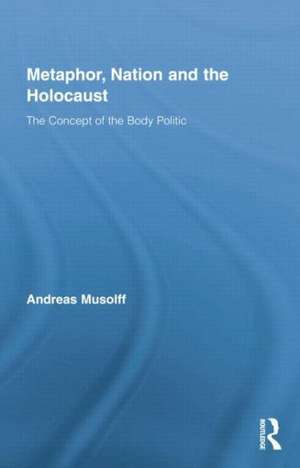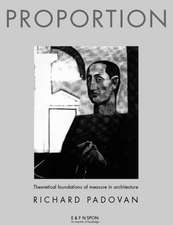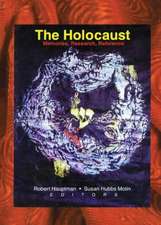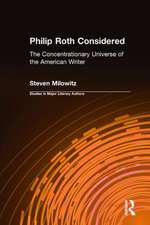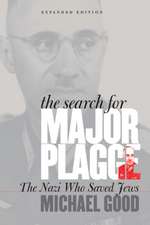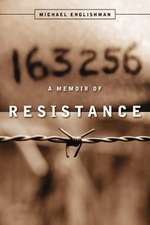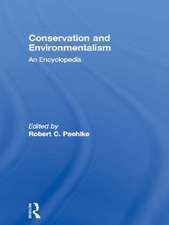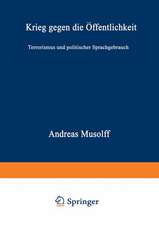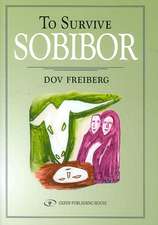Metaphor, Nation and the Holocaust: The Concept of the Body Politic: Routledge Critical Studies in Discourse
Autor Andreas Musolffen Limba Engleză Paperback – 10 noi 2014
| Toate formatele și edițiile | Preț | Express |
|---|---|---|
| Paperback (1) | 484.47 lei 6-8 săpt. | |
| Taylor & Francis – 10 noi 2014 | 484.47 lei 6-8 săpt. | |
| Hardback (1) | 1058.79 lei 6-8 săpt. | |
| Taylor & Francis – 9 iun 2010 | 1058.79 lei 6-8 săpt. |
Din seria Routledge Critical Studies in Discourse
-
 Preț: 311.41 lei
Preț: 311.41 lei -
 Preț: 431.57 lei
Preț: 431.57 lei -
 Preț: 483.49 lei
Preț: 483.49 lei - 17%
 Preț: 295.69 lei
Preț: 295.69 lei -
 Preț: 485.84 lei
Preț: 485.84 lei -
 Preț: 436.18 lei
Preț: 436.18 lei -
 Preț: 446.53 lei
Preț: 446.53 lei - 15%
 Preț: 209.80 lei
Preț: 209.80 lei - 20%
 Preț: 259.54 lei
Preț: 259.54 lei - 30%
 Preț: 846.92 lei
Preț: 846.92 lei -
 Preț: 391.79 lei
Preț: 391.79 lei -
 Preț: 380.03 lei
Preț: 380.03 lei -
 Preț: 386.39 lei
Preț: 386.39 lei -
 Preț: 384.86 lei
Preț: 384.86 lei - 18%
 Preț: 894.39 lei
Preț: 894.39 lei -
 Preț: 389.66 lei
Preț: 389.66 lei - 18%
 Preț: 1005.04 lei
Preț: 1005.04 lei
Preț: 484.47 lei
Nou
Puncte Express: 727
Preț estimativ în valută:
92.73€ • 100.76$ • 77.95£
92.73€ • 100.76$ • 77.95£
Carte tipărită la comandă
Livrare economică 21 aprilie-05 mai
Preluare comenzi: 021 569.72.76
Specificații
ISBN-13: 9781138810037
ISBN-10: 1138810037
Pagini: 220
Ilustrații: 9 black & white tables
Dimensiuni: 152 x 229 x 15 mm
Greutate: 0.34 kg
Ediția:1
Editura: Taylor & Francis
Colecția Routledge
Seria Routledge Critical Studies in Discourse
Locul publicării:Oxford, United Kingdom
ISBN-10: 1138810037
Pagini: 220
Ilustrații: 9 black & white tables
Dimensiuni: 152 x 229 x 15 mm
Greutate: 0.34 kg
Ediția:1
Editura: Taylor & Francis
Colecția Routledge
Seria Routledge Critical Studies in Discourse
Locul publicării:Oxford, United Kingdom
Public țintă
Postgraduate and UndergraduateCuprins
Acknowledgments 1: Introduction: Deadly Metaphors That Won’t Die? Bodies and Parasites as Concepts of Political Discourse Part I 2: The Cognitive Import of Metaphor in Nazi Ideology 3: Body, Nature and Disease as Political Categories in Mein Kampf 4: The Public Presentation and Reception of Anti-Semitic Imagery in Nazi Germany 5: Methodological Reflection: Body and Illness Metaphors in the Evolution of Western Political Thought and Discourse Part II 6: Solidarity and Hierarchy: The State-Body Metaphor in the Middle Ages 7: Concepts of Healing the Body Politic in the Renaissance 8: From Political Anatomy to Social Pathology: Modern Scenarios of the Body Politic and its Therapy 9: German Conceptual and Discursive Traditions of the Body Politic Metaphor 10: Conclusion: Metaphor in Discourse History Notes Bibliography Index
Recenzii
"Musolff provides a fascinating investigation into the working of metaphors, particular Hitler's anti-Semitic metaphor scenarios."--Journal of Language and Politics 10:4
Descriere
The book analyses the conceptual and discursive traditions that underlay the Nazi use of body, illness and parasite metaphors in their genocidal anti-Semitic ideology. Part I gives a detailed analysis of this metaphor field in Hitler’s Mein Kampf and his public statements from the 1920s to 1945, when it served him and the Nazi propaganda machine to announce, justify and defend his main policy decisions to destroy European Jewry. The book also studies the evidence from secret surveillance reports and diaries that demonstrates the impact of the body-parasite metaphor complex on popular opinion in Germany 1933-1945 and in the post-war period. Part II of the book traces the history of this metaphor field back to the Middle Ages and the Renaissance when the concept of the (nation) state as a body emerged as a framework for political theory. After its translation into the European vernacular languages, the concept followed different discursive careers related to the divergent political cultures. The reconstruction of its German discourse history, reaching from Luther to the 20th century (and still continuing) shows that whilst there was no linear development towards the racist-genocidal applications of the metaphors in Nazi ideology, parts of the concept’s discourse history served as the basis for Holocaust ideology and propaganda and that its use deserves continued critical attention.
